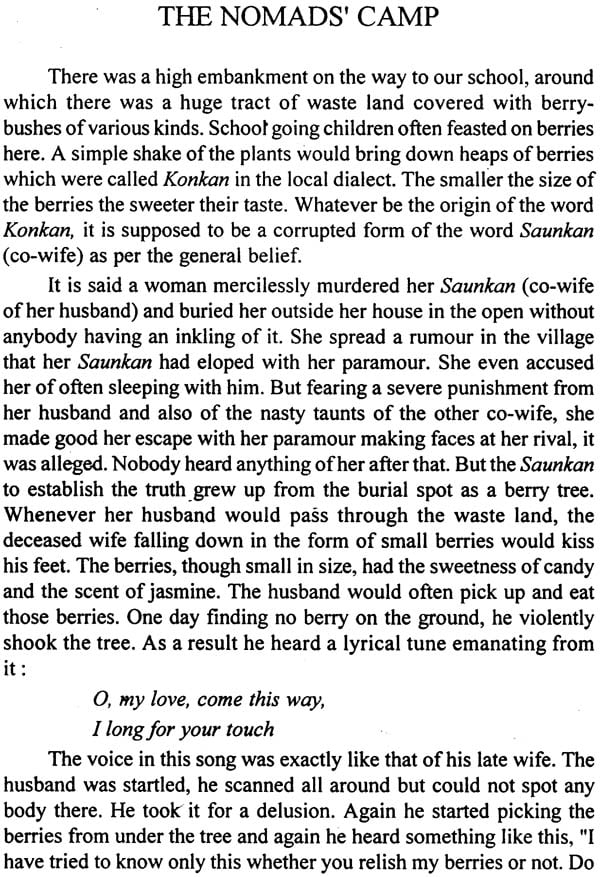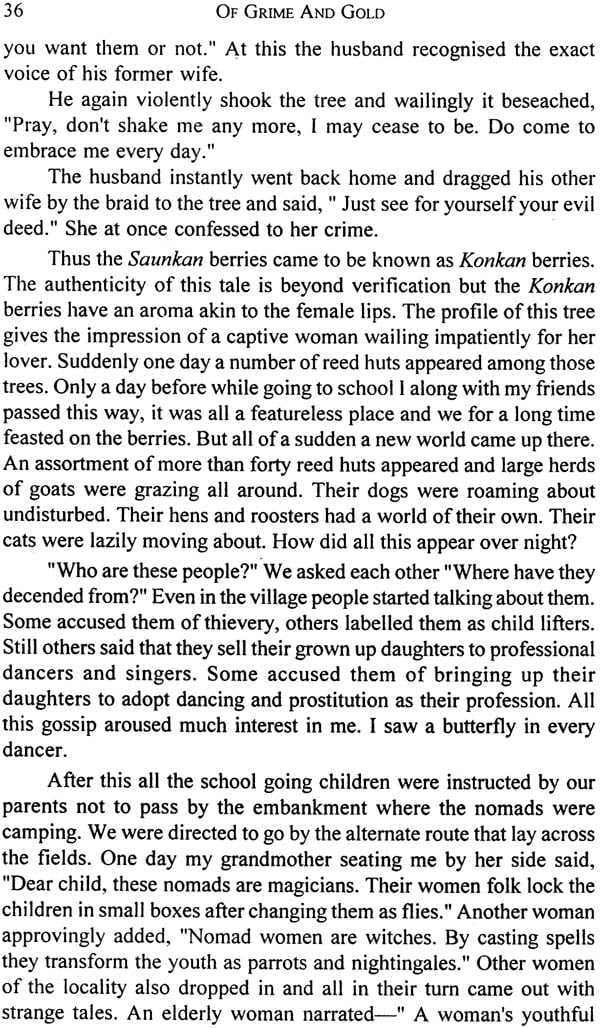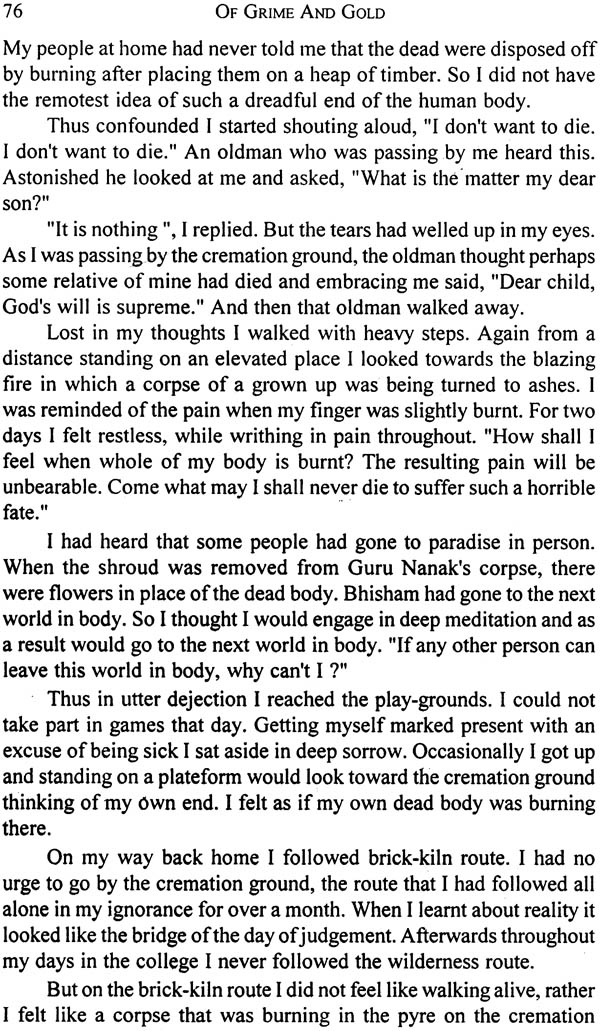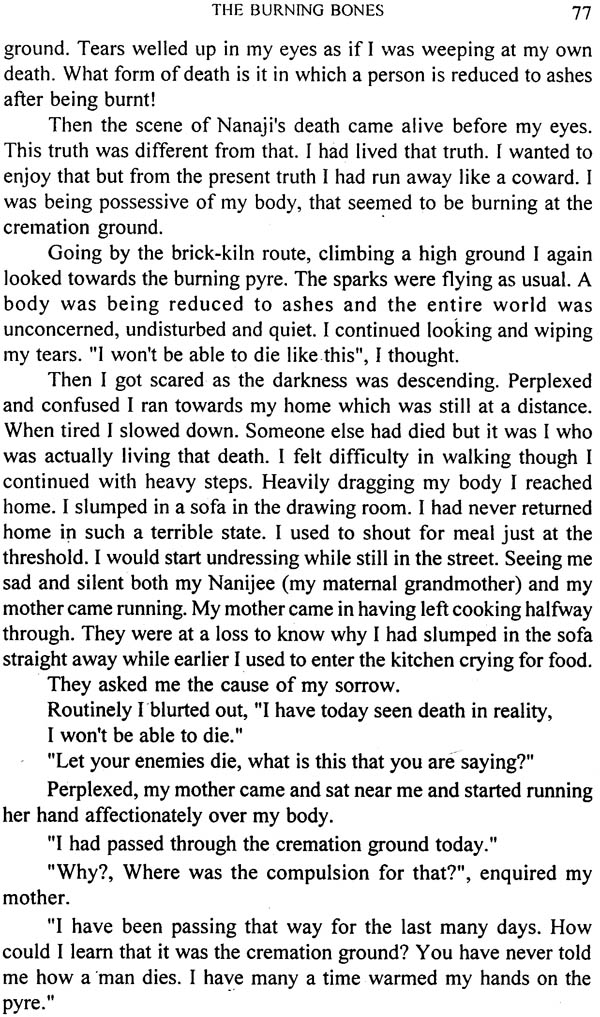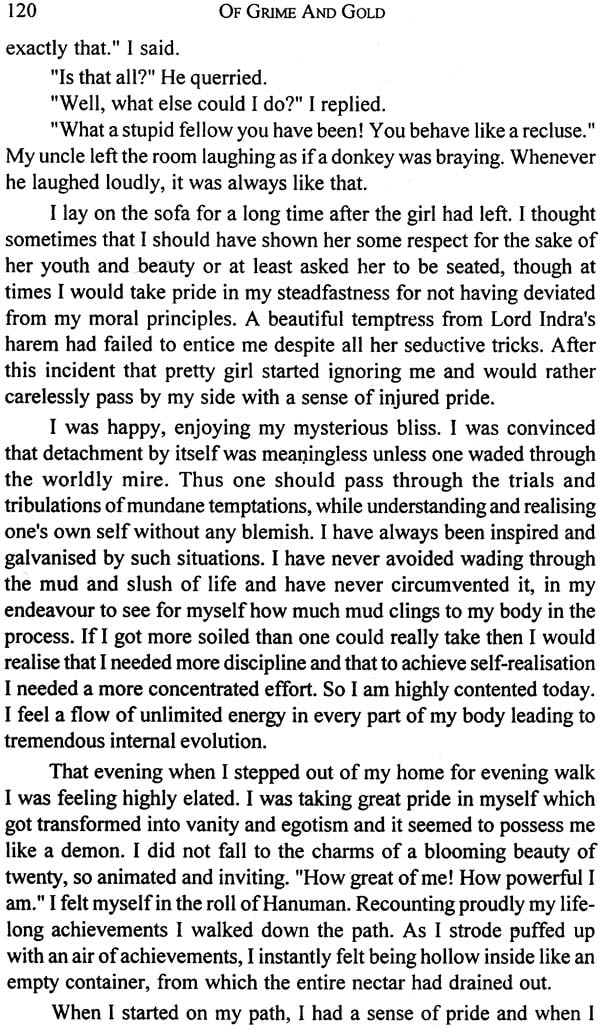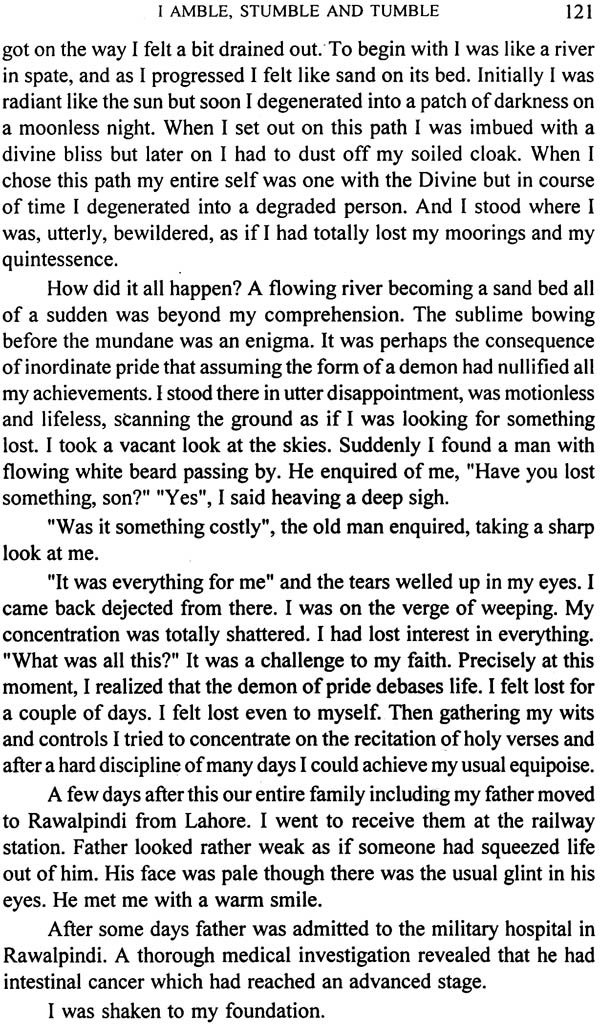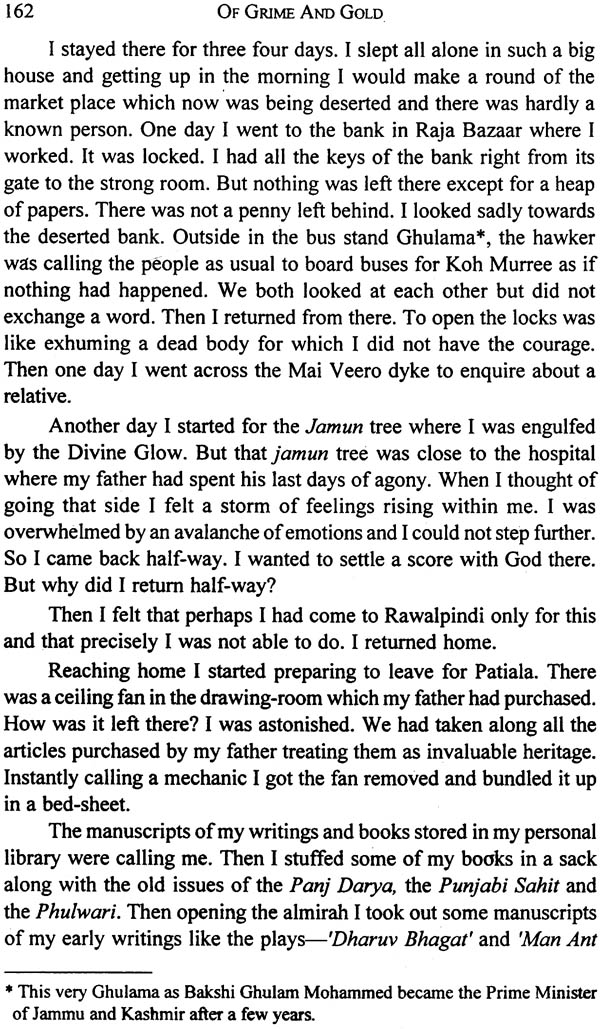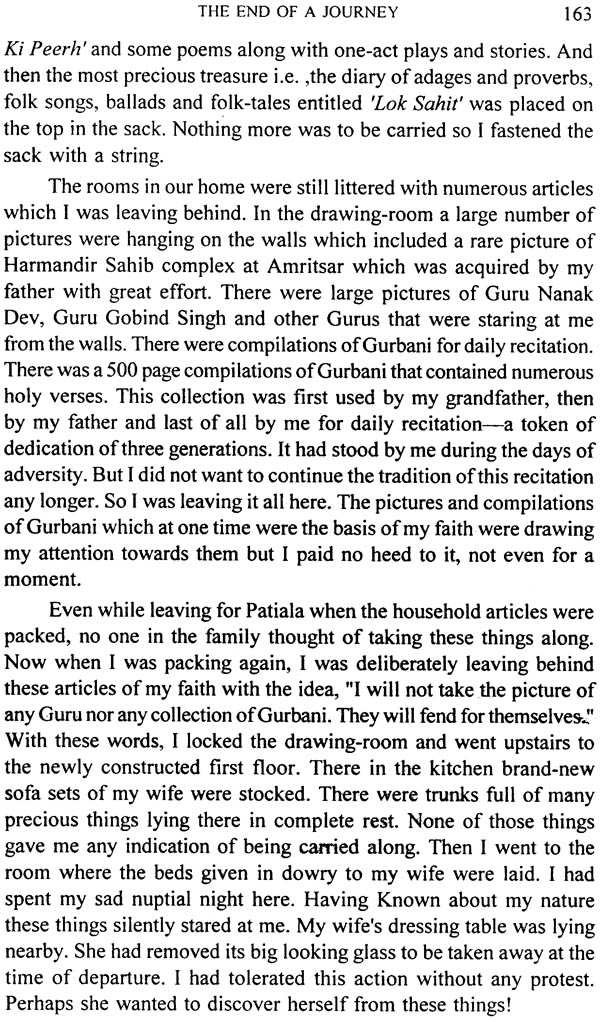
Of Grime And Gold (English Translation of Adhi Mitti Adha Sona : An Autobiography)
Book Specification
| Item Code: | NAG250 |
| Author: | Dr. Sohinder Singh Wanjara Bedi |
| Publisher: | Publication Bureau Punjabi University, Patiala |
| Language: | English |
| Edition: | 2006 |
| ISBN: | 8173808368 |
| Pages: | 188 |
| Cover: | Paperback |
| Other Details | 8.5 inch X 5.5 inch |
| Weight | 230 gm |
Book Description
In the days of yore an old father sent for his two sons and said the them, “My boys, tomorrow is the moonless Monday night. It is an important time. Go into the world, work hard till evening and earn as much as you can. Don’t return empty handed. Tomorrow I’ll sow some coins in our field.”
Both the brothers took bath and set out. The elder went towards the north and the younger towards the south. The elder son was a hard working boy. He went on and on reached the banks of a pond full of fish. Hr made a fishing net of his turban and was able to catch a fish after a day’s toil. He sold it in the market for a paisa and gave the money to his father. The younger brother who had gone towards the south met his friends sitting in the village community centre. He whiled away his time gossiping and playing with them. In the evening when he was to come back he grew worried. But suddenly he found a coin lying there on the ground which he brought home and gave it to his father.
On the moonless Monday night, the old man tied both the coins with a red string and sowed them in his fields. He said to his sons, “My boys, if on this auspicious day hard earned money is sowed in the land with prayers and a little water, a golden plant grows on the full moon night. “ For fourteen days the old man prayed and watered his ‘seeds’. On the full moon night a plant waved in the wind- one half of it was made of gold and the other of grime. The golden half was the boon of the labour of the elder son and grimy half the bane of the unearned coin of the younger one.
My life story is also half grime and half gold. Grime, I have inherited from the generations of my ancestors. It is the dust of black shadows powdered on my soul. This is my primary self. But the gold in me is the product of the soul of my folklore. This is the glow emitted by the culture of Punjab. I is the gold warned by the Punjabis after a long toil. They have created it from their and blood. I have covered my soul with these gold particles so that I can hide my grimy self. In my life-story I have tried to sell dust particles with golden onces at the same price. Dust is my truth and gold the truth and gold the truth of my people. I have turned my duties truth golden by mixing it with the golden dust of my folklore. This narrative is the truth of my first twenty two and half years. These years may not matter much in one’s life but they do fecundate rest of your life.-span, both totally different from each other. When at the age of twenty two and half, confined to my own impossible for me to carry my own self on my shoulders. Then it became necessary for me to slough off m y past not only from my physical frame but also from my memory. Pheonix like, I burnt myself in my own grief and rose from the ashes a new man with new aspirations. Some orthodoxies of these years went on lurking in my unconscious, through they no longer belong to me, rather they have became a myth, well settled in my mind which I never recall, nor do I ever think to them. So I today I am not what I was. I am not what this tale represents either. This is the truth in one of them. This autobiography of mine is full of co-incidences. Had these co-incidences been a part of a novel, they would have been treated as a failure of the novelist. But being a part of my life, they may be treated as a failure of may creator, For instance when I decided to renounce this world, a maiden appeared in my dream and kissed me which aroused the unleashed my dormant youth. Or had my father not died the night he did, that would have been the night of consumption of my marriage.
I planned this autobiography a number of times. But the first twenty two years which stand expunged from my life seemed alien to me. Recently when Amrita Pritam asked me to do a feature about my “my room” for the “Nagmani”. My old wounds opened up and started bleeding. Thus the emotional ground was prepared for this autobiography.
An autobiography is a creative attempt at self identification in the crowded world. But man’s greatest misfortune is that he fails to recognize himself. His self having been lost in the crowd, changes its colour with the dust of time. It is not an easy task to dig out self from under the crust of this dust and then it rubs it bright and transparent. And thus it is not easy to peal off your feelings from yourself.
A special kind of mind-set is required to do your life-story. It needs an objective perspective that can find meaning in vice and virtue alike. The black spots on the moon surface enhance its beauty and give it a unique identity of its own.
If an autobiography is not done with sincerity, it loses its meanings and human belief does not last long on this account. Therefore, an autobiography is a feat of courage. But it may become easy to write about the first twenty two years, if we learn to wash the dirty linen in public. After this it is very difficult to reveal your black spots. It is not easy to portray the rest of your years with the same audacity as the portrayal of these twenty two years. Somebody may decide to strip himself off in the public but there are others who would like to remain under a veil. Who can do injustice to them?
I started this life-story on my birth day on November 28,1978 and completed it in a month and a half. Whatever was spontaneously written was not modified later on. This autobiography was initially entitled” do Pair Ghat Turna” after a folk song which means-walk less but walk with grace and the preface was entitled “Adhi Mitti Adha Sona” (Of Grime and Gold). But when Iqbal jee told me that a book with this title already exists then I renamed the book after the title of the preface “Adhi Mitti sona” (Of Grime and Gold).
| Departmental Note | v | |
| The Ambling Grace | vii | |
| 1 | The Sialkot of Salwan | 1 |
| 2 | Blessed by the creator | 7 |
| 3 | The Divine Benediction | 13 |
| 4 | To the Land of Raja Rasalu | 18 |
| 5 | My Earliest Memories | 23 |
| 6 | Hail! The Land of Dhani | 28 |
| 7 | The Nomad's Camp | 35 |
| 8 | The Breast-soil of Jalandhar | 41 |
| 9 | The Broken Baptism | 51 |
| 10 | Then I Wield the Pen | 59 |
| 11 | the Bliss of Death | 67 |
| 12 | The Burning Bones | 73 |
| 13 | My Great Fall | 79 |
| 14 | Body and Soul: Indigence and Renunciation | 90 |
| 15 | Black Wisdom: White ways | 104 |
| 16 | I Amble, Stumble and Tumble | 115 |
| 17 | Imbued with Divine Glow | 123 |
| 18 | So This was Thy Goodness | 129 |
| 19 | A Damned Freindship | 136 |
| 20 | Under the Shadow of Grief | 141 |
| 21 | Then Broke the Storm | 146 |
| 22 | Adieu, Sweet home! | 153 |
| 23 | The End of a Jouney | 161 |
